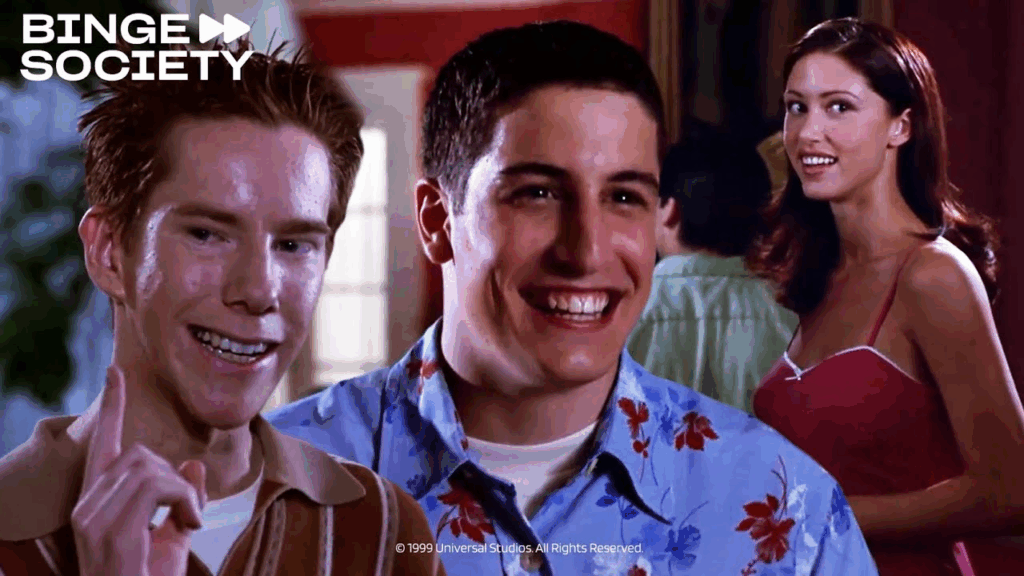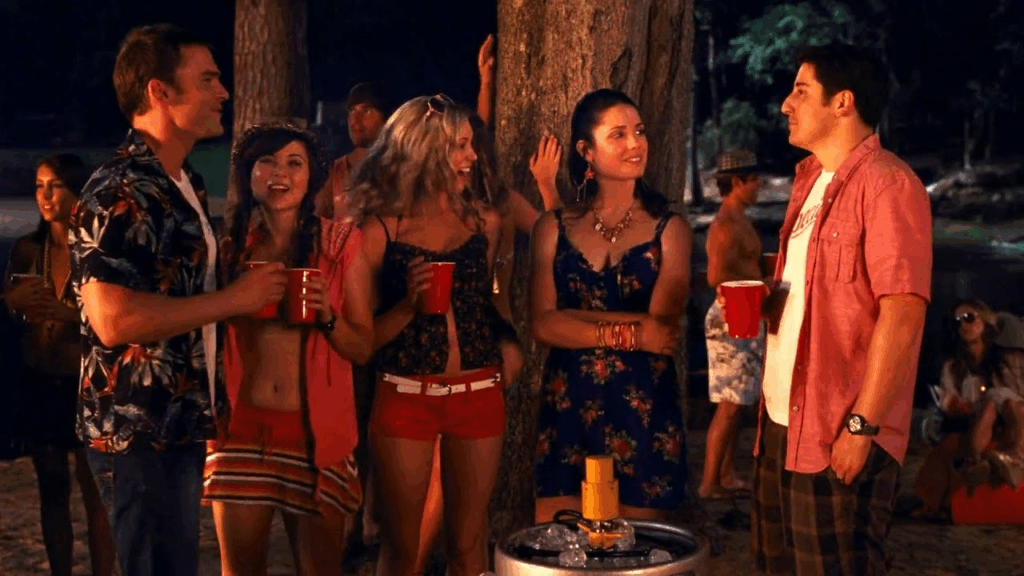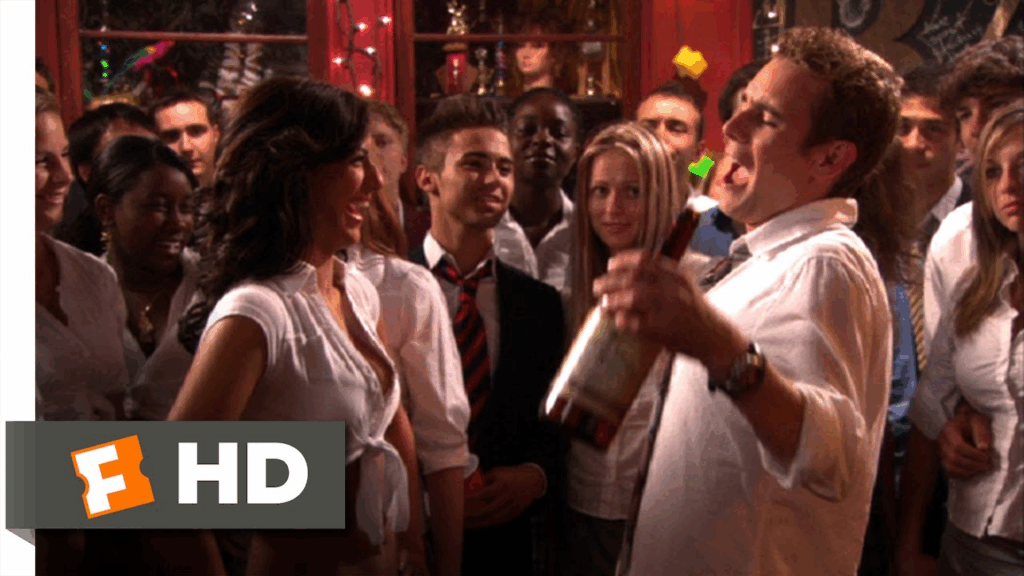American Pie

American Pie (1999): A Raunchy Comedy Classic That Defined a Generation
Released on July 9, 1999, American Pie is a landmark American teen comedy that redefined the genre with its irreverent humor, relatable coming-of-age story, and iconic moments that have seeped into pop culture. Directed by brothers Paul Weitz and Chris Weitz in their feature debut, and written by Adam Herz, the film follows a group of high school friends ***, leading to a series of hilarious and cringe-worthy misadventures. Starring a breakout ensemble including Jason Biggs, Chris Klein, Alyson Hannigan, and Seann William Scott, American Pie grossed over $235 million worldwide on an $11 million budget, launching a franchise and cementing its status as a cultural touchstone. This comprehensive article explores the film’s origins, plot, cast, themes, production, reception, and enduring legacy, celebrating its role as a raunchy yet heartfelt classic.

Background and Origins
American Pie emerged during a late-1990s renaissance of teen comedies, following hits like Clueless (1995) and Can’t Hardly Wait (1998). The film was inspired by writer Adam Herz’s experiences at East Grand Rapids High School, aiming to capture the awkward, hormone-driven essence of adolescence with a modern twist. Herz’s script, originally titled Untitled Teenage Sex Comedy, was picked up by Universal Pictures after a bidding war, drawn to its blend of crude humor and emotional authenticity. The Weitz brothers, fresh from writing Antz (1998), were chosen to direct, bringing a balance of sharp comedy and grounded character moments.
The film draws loosely from 1980s teen classics like Porky’s and Fast Times at Ridgemont High, but distinguishes itself with a more inclusive, less mean-spirited tone, reflecting the era’s shift toward ensemble-driven narratives. Its title, derived from Don McLean’s 1971 song and a now-infamous pie-related scene, evokes nostalgia while signaling its bold, risqué humor. Produced by Universal and Zide-Perry Productions, American Pie was a gamble on a low-budget comedy with unknown actors, but its universal themes and clever marketing made it a global phenomenon.

Plot Summary
Set in the fictional town of East Great Falls, Michigan, American Pie follows four high school seniors—Jim Levenstein (Jason Biggs), Kevin Myers (Thomas Ian Nicholas), Chris “Oz” Ostreicher (Chris Klein), and Paul Finch (Eddie Kaye Thomas)—who make a pact to lose their virginity by prom night. The story kicks off at a party where the group, frustrated by their lack of romantic success, resolves to achieve their goal before graduation. Their friend Steve Stifler (Seann William Scott), a brash jock, hosts the bash and becomes a chaotic catalyst for their misadventures.
Jim, an awkward everyman, pursues a relationship with band geek Michelle (Alyson Hannigan), leading to the infamous scene where he’s *** (Eugene Levy and Natasha Lyonne) in a ***. Kevin tries to advance his relationship with girlfriend Vicky (Tara Reid), navigating pressures of intimacy. Oz, a lacrosse player, joins the choir to woo Heather (Mena Suvari), discovering genuine feelings, while Finch cultivates a mysterious reputation, only to face humiliation orchestrated by Stifler. The group’s schemes—ranging from spying on foreign exchange student Nadia (Shannon Elizabeth) to hosting a wild prom afterparty—unravel with hilarious consequences, blending crude gags with heartfelt moments.
As prom night approaches, each character confronts their insecurities, learning that sex is less about conquest and more about connection. The climax at Stifler’s lakeside party sees resolutions for each arc: Jim’s unexpected bond with Michelle, Kevin and Vicky’s bittersweet breakup, Oz and Heather’s budding romance, and Finch’s surprising triumph. The film ends with the friends looking toward college, their friendship strengthened despite their missteps.

Cast and Characters
American Pie introduced a talented ensemble, many of whom became stars:
- Jason Biggs as Jim Levenstein: Biggs anchors the film as the relatable, horny-but-earnest Jim, whose pie incident and webcam mishap became iconic. His comedic timing and vulnerability make him the heart of the story.
- Chris Klein as Chris “Oz” Ostreicher: Klein’s sincere jock-turned-romantic brings warmth to Oz’s arc, particularly in his chemistry with Mena Suvari’s Heather.
- Thomas Ian Nicholas as Kevin Myers: Nicholas plays the group’s de facto leader, balancing determination and sensitivity in his pursuit of Vicky.
- Eddie Kaye Thomas as Paul Finch: Thomas’s deadpan delivery makes Finch, the intellectual with a fabricated mystique, a fan favorite.
- Seann William Scott as Steve Stifler: Scott steals scenes as the obnoxious, party-loving Stifler, whose crude antics coined the term “Stifler’s Mom” (Jennifer Coolidge).
- Supporting Cast: Alyson Hannigan shines as the quirky Michelle, whose “this one time, at band camp” line became a cultural catchphrase. Tara Reid, Mena Suvari, Shannon Elizabeth, Natasha Lyonne, and Eugene Levy (as Jim’s awkward dad) add depth, with Levy’s improvised father-son talks becoming a franchise staple.
The ensemble’s chemistry, blending humor and relatability, made the characters enduring archetypes of teen comedy.

Themes and Style
American Pie balances raunchy humor with universal coming-of-age themes:
- *** Awakening: The film captures the awkwardness and pressure of teenage sexuality, portraying the characters’ quest as both comedic and relatable, emphasizing emotional growth over mere conquest.
- Friendship and Loyalty: The pact strengthens the group’s bond, with their failures and triumphs highlighting the importance of camaraderie.
- Identity and Maturity: Each character grapples with societal expectations—Jim’s insecurity, Oz’s sensitivity, Finch’s pretense—learning to embrace authenticity.
- Humor vs. Heart: The film tempers its crude gags (e.g., the pie scene, Stifler’s beer prank) with genuine moments of vulnerability, avoiding the mean-spiritedness of earlier teen comedies.
Stylistically, American Pie is a quintessential late-’90s teen flick, with a bright, suburban aesthetic, pop-heavy soundtrack (featuring Blink-182, Third Eye Blind, and Barenaked Ladies), and snappy pacing. The Weitz brothers’ direction keeps the 95-minute runtime tight, balancing slapstick, gross-out humor, and heartfelt scenes. The film’s R rating allows*** , though its humor feels inclusive compared to Porky’s. Cinematography by Richard Crudo and editing by Priscilla Nedd-Friendly maintain a lively, accessible vibe, making the film a nostalgic snapshot of the era.

Production and Release
Produced by Universal Pictures and Zide-Perry Productions, American Pie was filmed in Los Angeles in 1998 on an $11 million budget, leveraging local high schools like Millikan and Long Beach Polytechnic for authenticity. The Weitz brothers, despite their inexperience, brought a fresh perspective, encouraging improvisation (notably Levy’s scenes) to enhance the comedy. The infamous pie scene required multiple takes and a custom-baked pie to achieve its effect, becoming a defining moment.
The film faced challenges with its R rating, requiring edits to tone down explicit content, such as the Nadia webcam sequence, to avoid an NC-17 rating. Universal’s marketing leaned into the humor, with trailers and posters emphasizing the pie and Stifler’s antics, targeting teens and young adults. Released on July 9, 1999, in 2,508 theaters, American Pie opened to $18.7 million, competing with Wild Wild West and Big Daddy. It grossed $102.6 million domestically and $132.9 million internationally for a $235.5 million total, a massive success for its modest budget.

Reception and Cultural Impact
American Pie received mixed-to-positive reviews, earning a 61% Rotten Tomatoes score from 131 reviews. Critics praised its humor and heart, with Roger Ebert giving it three stars, calling it “cheerful and raunchy” with “surprising sweetness.” Janet Maslin of The New York Times lauded its “gleeful energy,” though some, like Entertainment Weekly, found its gross-out gags uneven. Audiences embraced it, with a “B+” CinemaScore and strong word-of-mouth driving its box office longevity.
The film’s cultural impact is immense, spawning three direct sequels (American Pie 2, American Wedding, American Reunion), four spin-off films (American Pie Presents), and a franchise grossing over $1 billion. Phrases like “MILF” and “this one time, at band camp” entered the lexicon, and Stifler’s Mom became a pop culture archetype. The movie revitalized the teen comedy genre, paving the way for films like Superbad and The 40-Year-Old Virgin. Its depiction of teenage ***, while controversial for its ***, resonated with audiences for its honesty, though some later critiques noted its male-centric perspective.
On platforms like Letterboxd, fans call it a “nostalgic masterpiece” and “the ultimate ’90s teen flick,” though modern viewers debate its dated gender dynamics. The film’s influence persists in comedy, with its balance of crude humor and emotional resonance shaping the genre for decades.

Where to Watch
As of May 24, 2025, American Pie is available to stream on Peacock, Netflix, and Amazon Prime Video (for rent or purchase). Physical copies on Blu-ray, DVD, and 4K UHD are available via retailers like Amazon, with ***. Check JustWatch for current availability.
Conclusion
American Pie (1999) is a defining teen comedy that blends raunchy humor with heartfelt coming-of-age storytelling, capturing the awkwardness and exuberance of youth. With a breakout ensemble led by Jason Biggs, Seann William Scott, and Alyson Hannigan, and the Weitz brothers’ assured direction, the film delivers iconic moments that have endured in pop culture. Its exploration of friendship, ***, and maturity, wrapped in a vibrant ’90s aesthetic, made it a box office juggernaut and cultural phenomenon. Despite some dated elements, American Pie remains a beloved classic, its legacy evident in its franchise, catchphrases, and influence on comedy. For fans of nostalgia or newcomers seeking a laugh-out-loud time capsule, American Pie is a slice of cinematic history worth savoring.